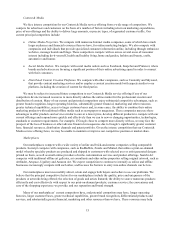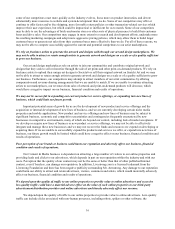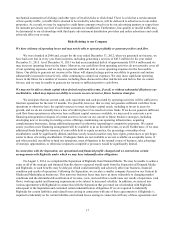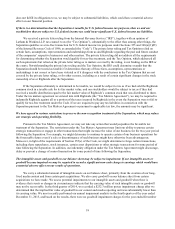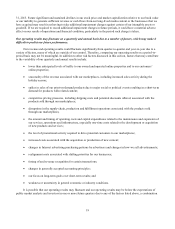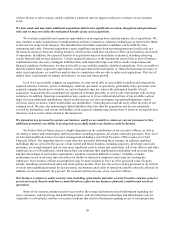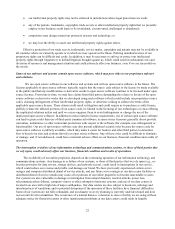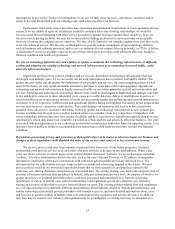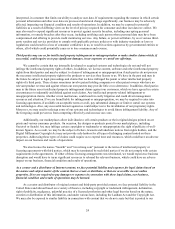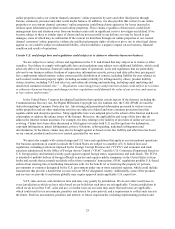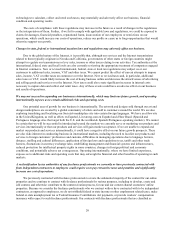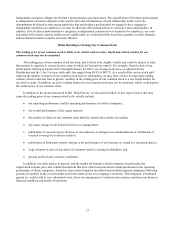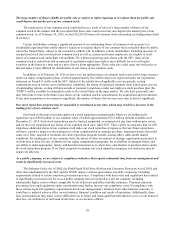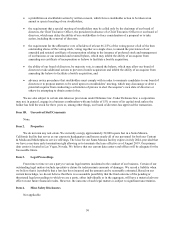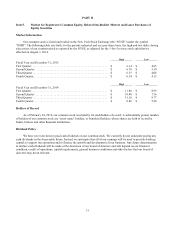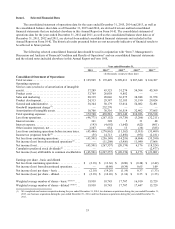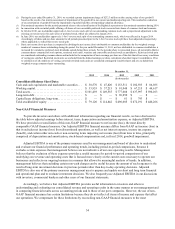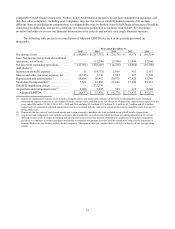Enom 2015 Annual Report Download - page 27
Download and view the complete annual report
Please find page 27 of the 2015 Enom annual report below. You can navigate through the pages in the report by either clicking on the pages listed below, or by using the keyword search tool below to find specific information within the annual report.25
online properties and to our content channel customers’ online properties by users and other third parties through
forums, comments, personas and other social media features. In addition, it is also possible that visitors to our online
properties or our content channel customers’ online properties could bring claims against us for losses incurred in
reliance upon information provided on such online properties. These claims, regardless of their merit, could divert
management time and attention away from our business and result in significant costs to investigate and defend. If we
become subject to these or similar types of claims and are not successful in our defense, we may be forced to pay
damages, some of which may be substantial. If the content we distribute through our online properties or our content
channel customers’ online properties violates the intellectual property rights of others or gives rise to other legal claims
against us, we could be subject to substantial liability, which could have a negative impact on our business, financial
condition and results of operations.
Certain U.S. and foreign laws and regulations could subject us to claims or otherwise harm our business.
We are subject to a variety of laws and regulations in the U.S. and abroad that may subject us to claims or other
remedies. Our failure to comply with applicable laws and regulations may subject us to additional liabilities, which could
adversely affect our business, financial condition and results of operations. Laws and regulations that are particularly
relevant to our business address freedom of expression; information security; privacy and data collection; pricing and
fees; employment related matters; online content and the distribution of content, including liability for user reliance on
such content; intellectual property rights, including secondary liability for infringement by others; product liability
claims; taxation, including VAT and sales tax; and online advertising and marketing, including email marketing and
unsolicited commercial email. See “ — Regulations concerning privacy and protection of data could subject us to claims
or otherwise harm our business and changes in these regulations could diminish the value of our services and cause us
to lose visitors and revenue.”
In the United States, Congress has adopted legislation that regulates certain aspects of the Internet, including the
Communications Decency Act, the Digital Millenium Copyright Act, the Lanham Act, the CAN-SPAM Act and the
Anticybersquatting Consumer Protection Act. Advertising and promotional information presented to visitors on our
online properties and our other marketing activities are subject to federal and state consumer protection laws that
regulate unfair and deceptive practices. Many applicable laws were adopted prior to the advent of the Internet and do not
contemplate or address the unique issues of the Internet. Moreover, the applicability and scope of the laws that do
address the Internet remain uncertain. For example, the laws relating to the liability of providers of online services are
evolving. Claims have been either threatened or filed against us under both U.S. and foreign laws for defamation,
copyright infringement, patent infringement, privacy violations, cybersquatting, trademark infringement and
discrimination. In the future, claims may also be brought against us based on tort law liability and other theories based
on our content, products and services or content generated by our users.
We must also comply with certain foreign and U.S. laws and regulations that apply to our international operations.
Our business operations in countries outside the United States are subject to a number of U.S. federal laws and
regulations, including restrictions imposed by the Foreign Corrupt Practices Act (“FCPA”) and economic and trade
sanctions administered by the Office of Foreign Assets Control (“OFAC”) and the U.S. Commerce Department based on
U.S. foreign policy and national security goals against targeted foreign states, organizations and individuals. The FCPA
is intended to prohibit bribery of foreign officials or parties and requires public companies in the United States to keep
books and records that accurately and fairly reflect those companies’ transactions. OFAC regulations prohibit U.S.-based
entities from entering into or facilitating transactions with, for the benefit of, or involving the property of, persons,
governments or countries designated by the U.S. government under one or more sanctions regimes, which could include
transactions that provide a benefit that is received in an OFAC designated country. Additionally, some of the products
and services we provide to customers globally may require approval under applicable U.S. export law.
VAT, sales and use, and similar tax laws and rates vary greatly by jurisdiction. We do not collect such taxes in
every jurisdiction in which we have sales based on our belief that such taxes are not applicable. Certain jurisdictions in
which we do not collect VAT, sales and use, or similar taxes on our sales may assert that such taxes are applicable,
which could result in tax assessments, penalties and interest for prior periods, and a requirement to collect such taxes in
the future. Such tax assessments, penalties and interest, or future requirements, including implementing products and


